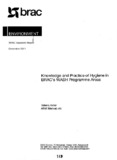| dc.contributor.author | Akter, Tahera | |
| dc.contributor.author | Ali, ARM Mehrab | |
| dc.date.accessioned | 2019-12-02T05:58:05Z | |
| dc.date.available | 2019-12-02T05:58:05Z | |
| dc.date.issued | 2011-12 | |
| dc.identifier.citation | Akter, T., & Ali, A. M. (2011, December). Knowledge and practice of hygiene in BRAC’s WASH Programme areas. Research Reports (2011): Health Studies, Vol - XLIII, 149–179. | en_US |
| dc.identifier.uri | http://hdl.handle.net/10361/13164 | |
| dc.description.abstract | Improved hygiene behaviour is one of the most effective means of reducing disease
occurrence. However, question may arise, which factors did contribute to such
improvement? Past studies seldom addressed these issues systematically nor
explained the influencing factors that facilitate or impede hygiene knowledge and
practice from the perspectives of successful and unsuccessful households. This study,
combining qualitative and quantitative methods, measured the changes in knowledge
and practice of hygiene and explored factors that facilitate or impede hygiene
behaviours in water, sanitation and hygiene (WASH) intervention areas of BRAC. Indepth
interviews were conducted with 144 purposively selected women. Some of their
practices were physically verified to get the proof of their claims. Besides, 30,000
systematically chosen households studied in the baseline were revisited in the midline
survey for collecting quantitative data. Results on common variables investigated
through both quantitative and qualitative approaches were triangulated. Findings show
that respondent's hygiene behaviours were mainly facilitated by improved knowledge
and awareness about health and environment-related issues. BRAC's financial
assistance had positive impact on latrine ownership resulting in increased privacy and
dignity of the households. Latrine or tubewell ownership also increased their social
prestige and sense of responsibility. In this regard, maintaining hygiene behaviours for
healthy life was perceived as everybody's responsibility. On the other hand, lack of
interest in attending cluster meeting, traditional knowledge, poverty, difficulties in
carrying water, location of latrine, lack of will to practice, and complex mind-set were
the impeding factors to hygiene knowledge and practice. Mainly the psychosocial
aspects made the difference between successful and unsuccessful households, as
successful households followed hygiene behaviours irrespective of poverty and other
barriers. To increase awareness to a further extent and to transform knowledge into
practice and practice into habit, more cluster meetings ensuring participation of all
including children and home visits by the programme organizers are imperative. | en_US |
| dc.language.iso | en | en_US |
| dc.publisher | BRAC Research and Evaluation Division (RED) | en_US |
| dc.subject | Sanitation | en_US |
| dc.subject | BRAC WASH | en_US |
| dc.subject | BRAC | en_US |
| dc.subject | Hygiene | en_US |
| dc.subject.lcsh | Sanitation--Health aspects | |
| dc.subject.lcsh | Environmental health. | |
| dc.subject.lcsh | Hygiene | |
| dc.subject.lcsh | Health, Nutrition, and Population Program (BRAC) | |
| dc.title | Knowledge and practice of hygiene in BRAC's WASH Programme areas | en_US |
| dc.type | Research report | en_US |

